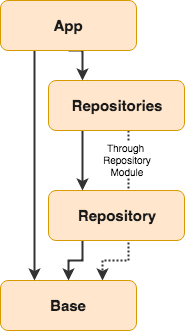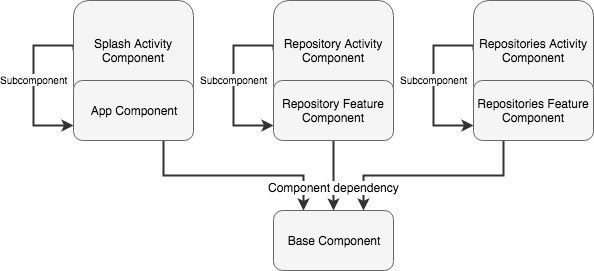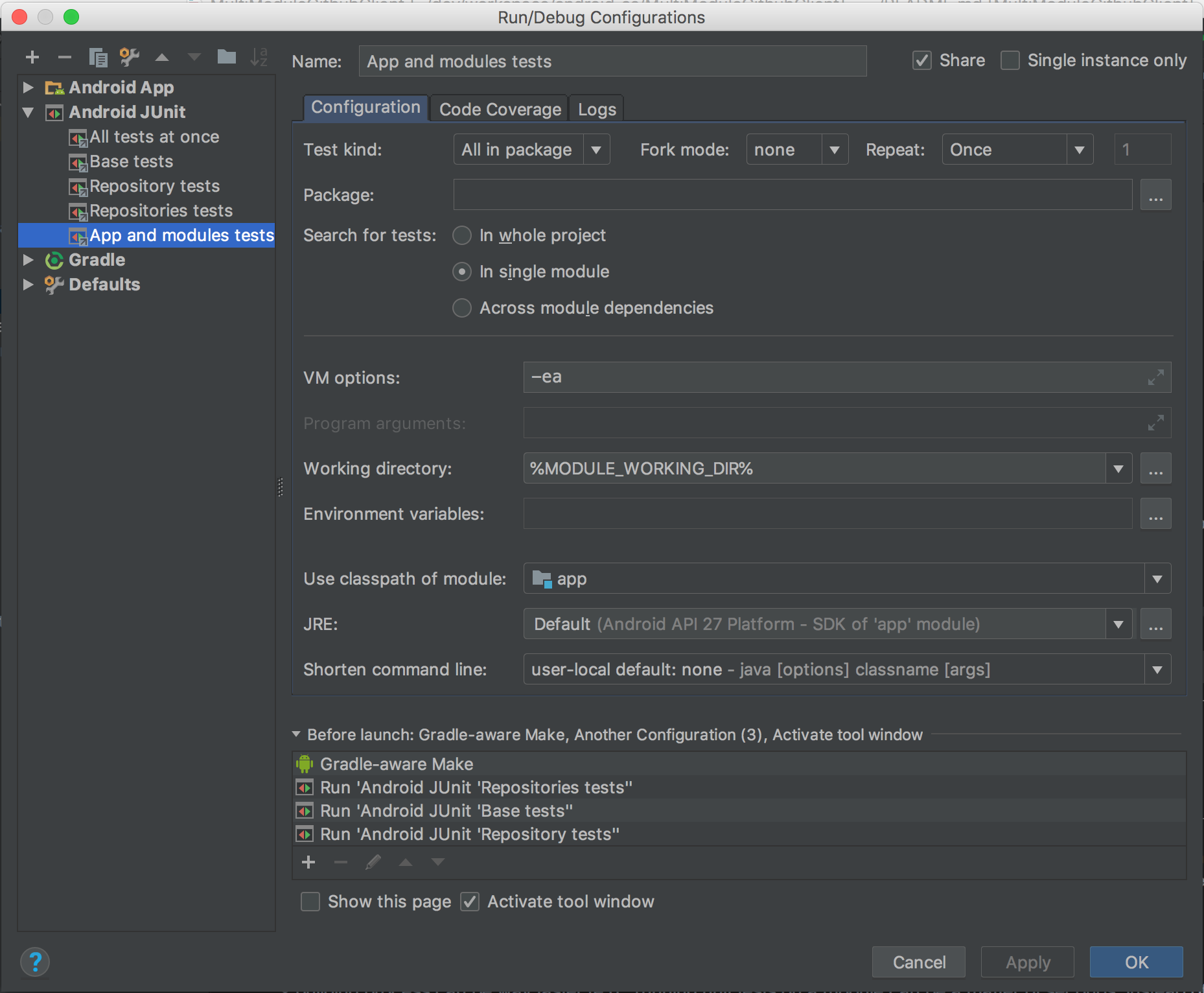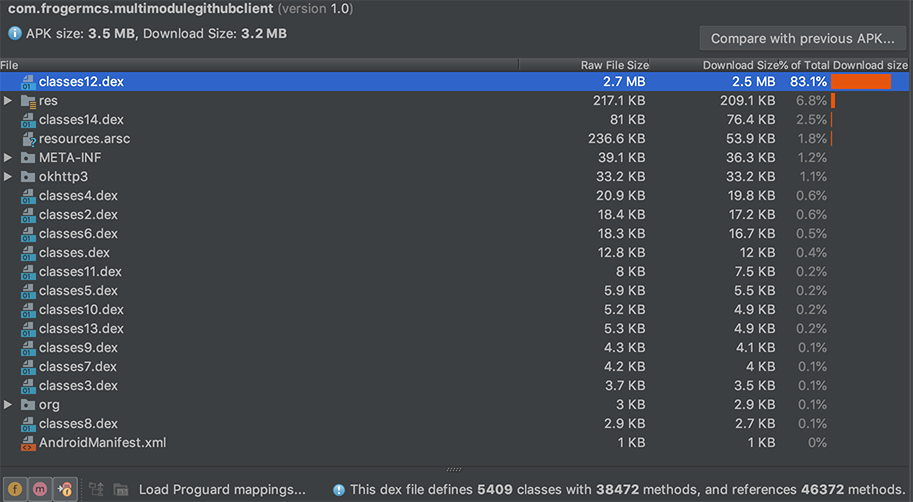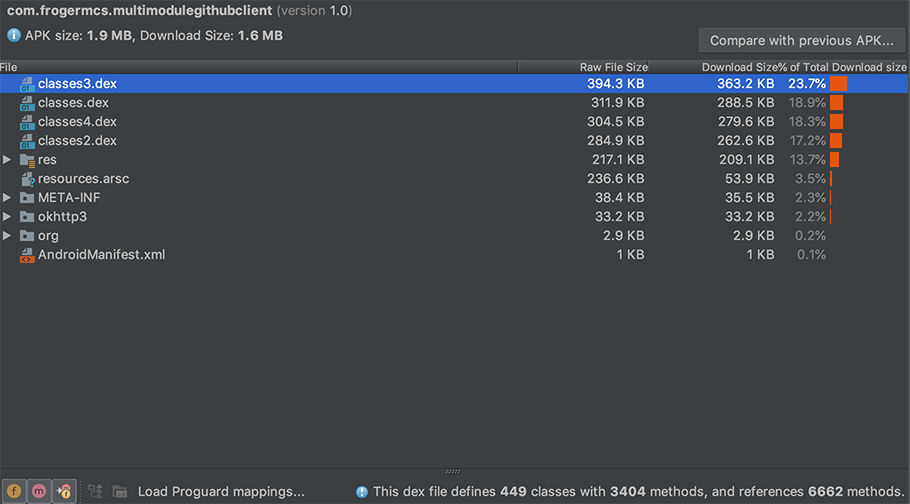frogermcs / Multimodulegithubclient
Programming Languages
Projects that are alternatives of or similar to Multimodulegithubclient
MultiModuleGithubClient
Breaking the monolith to microservices is a well-known concept to make backend solutions extendable and maintainable in a scale, by bigger teams. Since mobile apps have become more complex, very often developed by teams of tens of software engineers this concept also grows in mobile platforms. There are many benefits from having apps split into modules/features/libraries:
- features can be developed independently
- project structure is cleaner
- building process can be way faster (e.g., running unit tests on a module can be a matter of seconds, instead of minutes for the entire project)
- great starting point for instant apps
This is the example project which resolves (or at least workarounds) the most common problems with the multi-module Android app.
Project structure
The project is a straightforward Github API client containing 3 screens (user search, repositories list, repository details). For the sake of simplicity each screen is a separate module:
- app - application module containing main app screen (user search)
- repositories - repositories list
- repository - repository detail
- base - module containing a code shared between all modules
Dependencies management
It is easy to get lost with dependencies management across different project modules (especially with libs versions). To make it easier, take a look at buildsystem/dependencies.gradle where everything is configured. Each module has separate configuration, with additional two for testing and annotation processing. Like some other patterns, this was originally introduced in Azimo Android application by @dbarwacz.
Dagger 2
Recently there is no recommended Dagger 2 configuration for multi-module Android project. Some software engineers recommend exposing Dagger modules from Android feature module and use them in Components maintained only in the main App module. This project implements the second way - each feature module has its Component and dependencies tree. All of them depends on Base Component (created in Base module). All have their scope and subcomponents. This approach was proposed by my colleague @dbarwacz and recently is heavily used in Azimo Android application.
Here are some highlights from it:
-
BaseComponentis used as a dependency in feature components (e.g.RepositoriesFeatureComponent,AppComponent...). It means that all dependencies that are used in needs to be publicly exposed inBaseComponentinterface. - Local components, like
SplashActivityComponentare subcomponents of feature component (SplashActivityComponentis a subcomponent ofAppComponent). - Each module has its own Scope (e.g.
RepositoryFeatureScope,AppScope). Effectively they define singletons - they live as long as components, which are maintained by classes:AppComponentWrapper,RepositoryFeatureComponentWrapperwhich are singletons... . To have better control on Scopes lifecycle, a good idea would be to addrelease()method to ComponentWrappers.
For the rest take a look at the code - should be self-explaining. As this is just self-invented setup (that works on production!), all kind of feedback is warmly welcomed.
Unit Testing
Project contains some example unit tests for presenter classes.
Gradle
To run all unit tests from all modules at once execute:
./gradlew testDebugUnitTest
In console you can see:
...
> Task :app:testDebugUnitTest
com.frogermcs.multimodulegithubclient.SplashActivityPresenterTest > testNavigation_whenUserLoaded_thenShouldNavigateToRepositoriesList PASSED
com.frogermcs.multimodulegithubclient.SplashActivityPresenterTest > testErrorHandling_whenErrorOccuredWhileLoadingUser_thenShouldShowValidationError PASSED
com.frogermcs.multimodulegithubclient.SplashActivityPresenterTest > testValidation_whenUserNameIsInvalid_thenShouldShowValidationError PASSED
com.frogermcs.multimodulegithubclient.SplashActivityPresenterTest > testValidation_whenUserNameValid_thenShouldLoadUser PASSED
com.frogermcs.multimodulegithubclient.SplashActivityPresenterTest > testInit_shouldLogLaunchedScreenIntoAnalytics PASSED
> Task :features:base:testDebugUnitTest
com.frogermcs.multimodulegithubclient.base.ExampleUnitTest > addition_isCorrect PASSED
> Task :features:repositories:testDebugUnitTest
com.frogermcs.multimodulegithubclient.repositories.RepositoriesListActivityPresenterTest > testRepositories_whenRepositoriesAreLoaded_thenShouldBePresented PASSED
com.frogermcs.multimodulegithubclient.repositories.RepositoriesListActivityPresenterTest > testInit_shouldLoadRepositoriesForGivenUser PASSED
com.frogermcs.multimodulegithubclient.repositories.RepositoriesListActivityPresenterTest > testNavigation_whenRepositoryClicked_thenShouldLaunchRepositoryDetails PASSED
com.frogermcs.multimodulegithubclient.repositories.RepositoriesListActivityPresenterTest > testInit_shouldLogLaunchedScreenIntoAnalytics PASSED
> Task :features:repository:testDebugUnitTest
com.frogermcs.multimodulegithubclient.repository.RepositoryDetailsActivityPresenterTest > testUnit_shouldSetRepositoryDetails PASSED
com.frogermcs.multimodulegithubclient.repository.RepositoryDetailsActivityPresenterTest > testInit_shouldSetUserName PASSED
com.frogermcs.multimodulegithubclient.repository.RepositoryDetailsActivityPresenterTest > testInit_shouldLogLaunchedScreenIntoAnalytics PASSED
BUILD SUCCESSFUL in 55s
...
It can be useful especially when you run tests on your CI environment. To control logs take a look at file buildsystem/android_commons.gradle (it is included in all feature modules).
testOptions {
unitTests {
all {
testLogging {
events 'passed', 'skipped', 'failed'
}
}
}
}
In case you want to run unit test in one module, execute:
./gradlew clean app:testDebugUnitTest
or
/gradlew clean feature:repository:testDebugUnitTest
Android Studio
The repository contains shared configurations for running Unit Tests directly from Android Studio.
All tests at once
Recently it is not always possible to run all tests at once (see troubleshooting below).
All tests, module after module sequentially
Run App and modules tests. This configuration will run unit tests from all modules in separate tabs, one after another. To modify list of tests, click on Edit Configurations -> App and modules tests -> Before Launch.
Troubleshooting
- Class not found: ... Empty test suite. There is a bug in Android Studio which prevents from launching all unit tests at once, before their code is generated (what happens after the first run of unit tests for every single module independently). For more take a look at Android Studio bug tracker: https://issuetracker.google.com/issues/111154138.
Test coverage for unit tests
The project contains additional configuration for Jacoco that enables coverage report for Unit Tests (initially Jacoco reports cover Android Instrumentation Tests).
To run tests coverage, execute:
./gradlew testDebugUnitTestCoverage
Coverage report can be found in app/build/reports/jacoco/testDebugUnitTestCoverage/html/index.html (there is also an .xml file in case you would like to integrate coverage report with CI/CD environment.
Implementation details
Setting up a coverage report for Android Project isn't still straightforward and can take a couple of hours/days of exploration. Example setup in this project could be a little bit easier and more elegant, but some solutions are coded explicitly for better clarity. Here are some highlights:
- Each module should use Jacoco plugin
apply plugin: 'jacoco'and config (defined inandroid_commons.gradle):
buildTypes {
debug {
testCoverageEnabled true
}
}
-
App module defines custom Jacoco task called
testDebugUnitTestCoverage. Entire configuration can be found inbuildsystem/jacoco.gradle. The code should be self-explaining. -
Task
testDebugUnitTestCoveragedepends ontestDebugUnitTesttasks (each module separately). Thanks to it all sources required for coverage report are available before gradle starts generating it (in<module_dir>/build/....
Instrumentation Testing
Project contains example Instrumentation test.
Gradle
To run all Instrumentation tests from all modules at once launch emulator or plugin device and execute:
./gradlew connectedAndroidTest
When all goes fine, you should see testing report in app/build/reports/androidTests/connected/ directory.
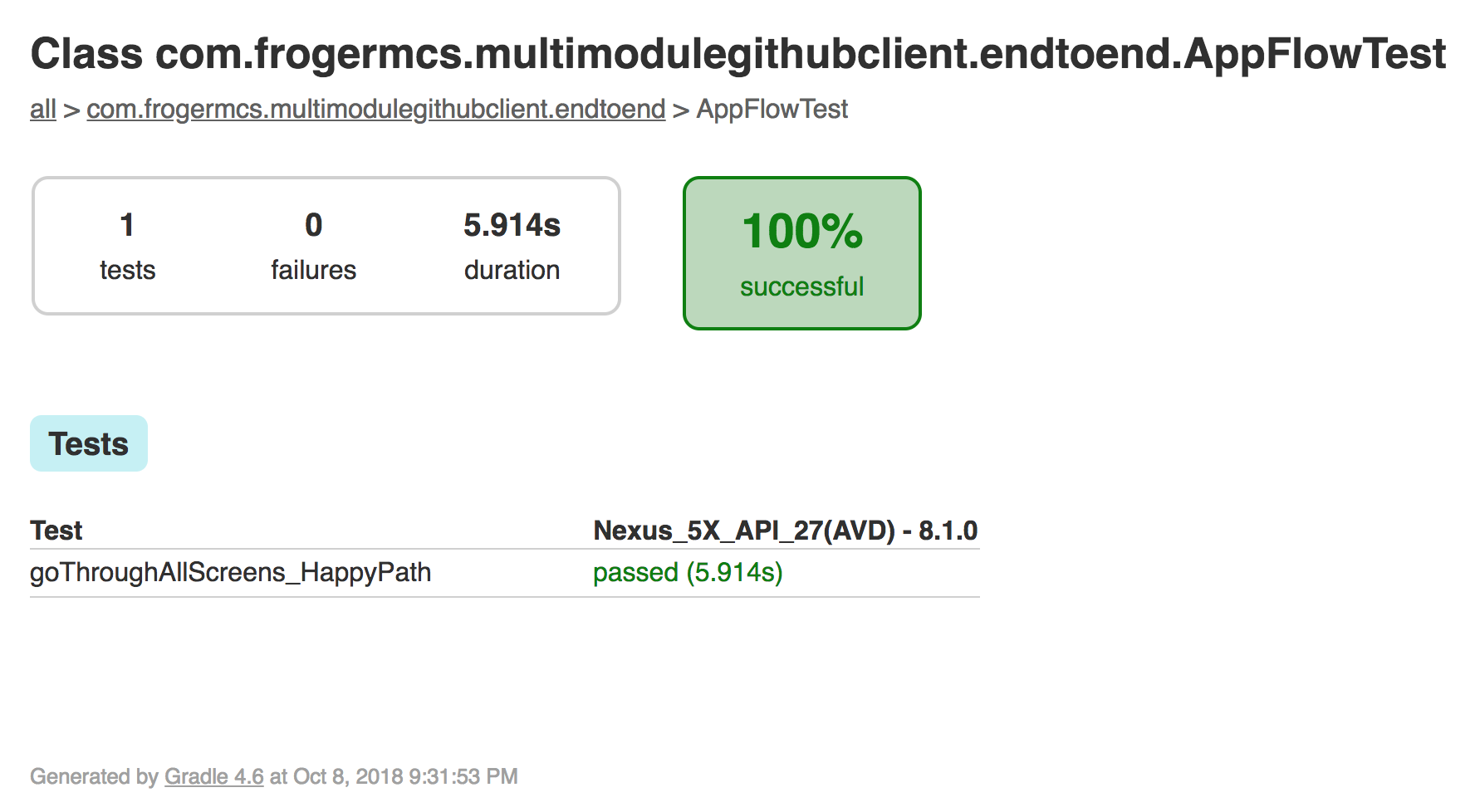
Functional vs End-to-end testing
From the high level, Android Instrumentation tests can be split into two types: functional and end-to-end. You can check my article about how we do QA at Azimo to see what is the difference between both of them.
Having in mind multi-feature config, it's pretty likely building functional tests can be more difficult. It's because your modules won't always see each other. In our example app module doesn't have knowledge about feature/repository module, so it means that instead of code:
intended(hasComponent(RepositoryDetailsActivity.class.getName()));
you need to use:
intended(hasComponent("com.frogermcs.multimodulegithubclient.repository.RepositoryDetailsActivity"));
It is, because app module doesn't have access to RepositoryDetailsActivity class.
What about end-to-end tests? They shouldn't be problematic, simply because tests shouldn't have knowledge about specific implementation, but rather how user interface is composed (so again, not: withText("R.string.show_repos") but withText("Show repositories")).
More cases: TBD
Proguard
Proguard configuration isn't very different in standard and multi-feature project configuration. Minification process is enabled in app/build.gradle file:
buildTypes {
debug {
minifyEnabled true
proguardFiles getDefaultProguardFile('proguard-android.txt'),
'proguard-rules.pro'
testProguardFile 'proguard-test-rules.pro'
}
//...
}
For proguard configuration and know-how we could create completely separate demo project and a bunch of articles. Instead, just take a look at screenshots that compare apk files built from this project, with and without minification enabled.
Project without proguard
Project with proguard
Proguard config for project modules
It is also possible to Provide proguard configuration for each module separately. Why would you like to do this? Usually Proguard configuration is set in app's module gradle file. Also all global flags -dontoptimize also should be set there.
But sometimes there are module-specific configurations. So for example you would like to keep methods or classes, even if they aren't used in app's module. Also when you share .aar library file, you can provide it with Proguard configuration built in.
In this situation you should use consumerProguardFiles. For example, see features/base/build.gradle (file)[features/base/feature-base-proguard-rules.pro]:
buildTypes {
all {
consumerProguardFiles 'feature-base-proguard-rules.pro'
}
}
Configuration tells:
-keep class com.frogermcs.multimodulegithubclient.base.BaseActivity {
public void notUsedMethod();
}
It means that method notUsedMethod() from class (BaseActivity)[features/base/src/main/java/com/frogermcs/multimodulegithubclient/base/BaseActivity.java] will be kept, no matter what.
For more details, take a look at this blog post that describes how to setup Proguard for multi-module android app.

